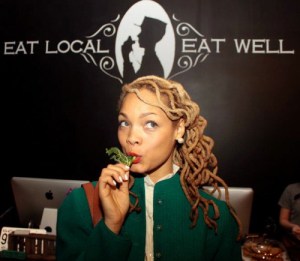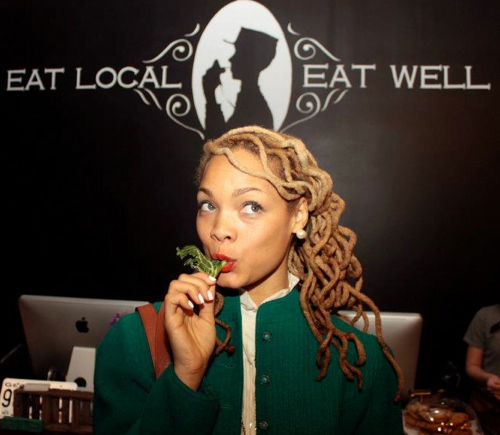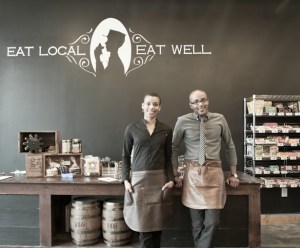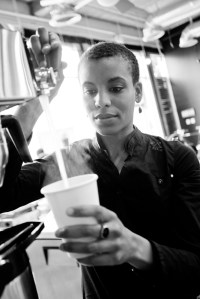Note: Earlier this year, we ran an interview with Alison about the corner store she and her brother launched in 2011. Now, we’ve invited her back to share her own perspective on the store.
Convenience store. Bodega. Corner store. Call it what you will, the one thing you cannot call most corner stores is healthy.
The reputation urban corner stores have is pretty consistent: crowded shelves, stuffy aisles, coolers filled with liquor and syrupy sweet sodas, lottery tickets spilling out from atop a dingy counter. You know there’s something wrong when the quality of the bulletproof glass at the register far surpasses the quality of the food in front of it. At its core, the corner store has been begging to be reinvented for decades.
When my brother and I began crafting our store, The Boxcar Grocer, as a way to give more people in the Atlanta community access to good food, we had no idea it would evolve into a mission to change an entire industry standard.
Our store concept challenges the notion that healthy food cannot be made available in a corner store setting. And it’s an idea that resonated beyond Atlanta — not only because as Black people, we look like the neighborhood demographic, but also because we’re committed to improving the community around us through partnerships with local producers to bring high quality food into the area.

A guest at The Boxcar Grocer's recent grand opening celebration shows us how glamorous kale can be. (Photo by Jess Smith.)
But when we opened the doors to the Grocer last fall, a funny thing happened. More and more middle class people who looked like our aunts and uncles and cousins began streaming through the doors with smiles on their faces. They biked over from their dorms at Morehouse. They walked over from the barbershop next door. They took lunch breaks from places like Spelman College and City Hall. Some had pickup trucks with lawn equipment in the back, and some had advanced degrees and comfortable jobs, but they all told us how great it felt to know that a store was reaching out to them as though they deserved to eat healthy food. And they loved the fact that much of the produce we sell is grown within the city of Atlanta. They asked questions about us and our farmers. They bought up all the Bryant Terry books we scattered around the store, and they returned week after week after week to ensure our business success, simply because we had cared enough to come to their neighborhood.
Our desire to change the corner store experience came from understanding the correlation between health and food access on an intellectual level. But our customers taught us to redefine what it means to be truly “accessible.” And sometimes access means helping people open their minds to new possibility.
The food justice movement tends to define the term narrowly, as in one’s proximity to a store. My brother and I decided we also wanted to dismantle the idea that organic food is only for people who cook like Martha Stewart and look like Jennifer Aniston, for people who live in other neighborhoods.
We want the actual lifestyle associated with eating organic food and preserving one’s health to be an accessible idea in the minds of all people. Right now it’s not. There are entire communities of people — Black and Latino people who look like my friends and I — wherein food-related illnesses such as diabetes, heart disease, strokes, and cancer are both expected and acceptable.
The Boxcar Grocer brand is a call, overall, to change these beliefs.
My brother and I grew up listening to hip-hop and watching MTV, so we’re aware of the power of the “lifestyle brand” to shape people’s behavior. “What if we used branding to treat organic sensibilities like an object in a Jay-Z rap?” we wondered. Would that help bridge the cultural gap that keeps people buying and eating unhealthy food? Because culture is a much bigger factor than income.
After all, how many people making minimum wage still rap along to Jay-Z as he sings: “(Ball so hard), got a broken clock, Rolleys that don’t tick tock, Audemars that’s losing time, hidden behind all these big rocks?”
Jay-Z created a lifestyle brand that people want to emulate, regardless of their income level. By seeing his brand as an extension of his life, he has influenced multiple generations with his music, Rocawear clothing line, chain of 40/40 Clubs, and deft ability to cross cultural boundaries while making it all look like one big party.
Ask yourself: When was the last time a health food store made a healthy lifestyle look like it was fun and accessible to an urban audience?
Once a month we trick out The Boxcar Grocer with a DJ who spins an eclectic mix of hip-hop and pop music for food tasting events. We’ve also built booths along the inside wall of our store to welcome local vendors to sell directly to the public any time of the week. The vintage train depot aesthetic that informs every design decision about the store interior resonates with its modernist minimalism. And our uniforms are a retro blend of shopkeeper and train porter with vintage leather aprons. People gravitate to our space as much as they gravitate to us because of the novelty of it all. It shows we’re doing something right.
The day people of all backgrounds flock to our store for kale and kohlrabi the way people line up to see Jay-Z perform in concert is the day we’ll call Boxcar Grocer a success.
Until then, we will continue to make the necessary connections to grow our store into a recognizable brand associated with health consciousness and urban farming. We’ll also keep improving on the corner store experience, and we’ll work from the belief that everybody deserves access to healthy food.





